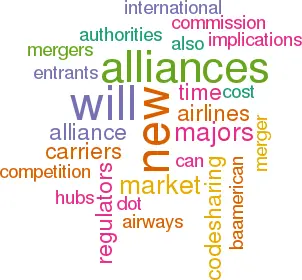The regulatory backlash
May 1998


The world’s leading airlines are succeeding in provoking the regulatory authorities into action.
There was a specific reason for the Continental/Northwest linkup, which we covered in the February issue of Aviation Strategy at the same time as we commented that a new industry consolidation phase was neither inevitable nor particularly logical. Consequently, American/US Airways and Delta/United announced plans for comprehensive code–share agreements, covering the domestic market only at present but eventually extending to the international markets.
These new virtual mergers come at a time when the US DoT is formulating new rules governing the US majors' responses to new entrants, essentially limiting the incumbent carriers’ ability to match a new entrant’s prices and drive it from the market by increasing capacity.
The majors generally regard such actions to be the correct tactic to ward off a threat; regulators tend to regard such action as predatory. Alfred Kahn, the father of US deregulation, has resurfaced and is advising the DoT on its policy; he admits that it is difficult to distinguish between vigorous competition and predation, but insists that the DoT now has to address the issue.
Kahn is arguing that incumbent carriers should not be allowed deliberately to take losses in order to drive out new entrants. And in estimating the costs of the incumbents' responses, regulators should look not just at the marginal cost of filling seats that otherwise would have gone empty, but also at the opportunity cost of not deploying capacity in the airline’s most profitable alternative market. (Lots of fun for economists here.)
Given the DoT’s stance, Congress’s investigation into the antitrust implications of alliances and a general disgruntlement with the level of business fares in the US, the majors are going to have a very difficult time selling their new alliances to the authorities. Although code–sharing agreements normally do not attract attention from the regulators, such are the implications of the new alliances that they can and probably will be investigated under the Sherman Act.
First, US airlines have spent a great deal of effort arguing that a reduced number of major carriers in the market did not imply a diminution in the intensity of competition, because competition took place between hubs with the majors battling to route passengers over their own hubs. The implication of the new alliances is that the number of competing hubs will be cut in half. It is not likely that the newly found complementarities between hub systems will stand up to scrutiny.
Second, because these alliances are marketing alliances only, it will not be possible to claim cost benefits in terms of rationalisation and economies of scales which would be passed on to passengers in terms of lower fares (a very weak argument for mergers in any case).
Third, regulators have intermittently worried about implications of FFPs because smaller airlines cannot offer competitive services, leaving the majors with a stranglehold on business travel. The proposed sharing of FFP benefits between the new alliance partners can only aggravate this market distortion.
Fourth, the international dimension seems hardly to have been considered, beyond statements to the effect that code–sharing will not be applied to international routes for the present. But what will the Commission make of the US developments? To take an obvious example, Delta and United are the US partners in two alliances that are supposed to be competing forcefully across the Atlantic. Will the Commission ask for guarantees that the domestic US code–sharing will not be extended ever to the Atlantic?
Already there appears to have been another delay in the Commission’s ruling on the BA/American alliance, which now may not be revealed until July (encroaching on les grandes vacances in Brussels), partly the result of the Commission attempting to examine the Lufthansa/United case at the same time. Adding US Airways back into the BA/American combine, even in a peripheral role, is certainly not going to speed things up.
Two observations can be made about the current alliance flux:
- In the mid/late–1980s the merger boom in the US was driven by a fear of being left out in the cold, and the same sort of mentality is reappearing today. But whereas some of the mergers that took place then were disastrous (viz Continental, Eastern, Frontier, People Express), the more tentative nature of code–sharing alliances today at least greatly reduces the downside. It is also much easier for the US authorities to intervene to dissolve a marketing merger than to try to order the dismantling of a full–scale merger.
- The longer the EC investigation into transatlantic alliances takes, the greater the risks for carriers both presently inside and outside the major groupings. If the EC rules in a way that allows British Airways and American to proceed, they will have more than three years of catching up with Star to do. If the EC decides in such a way that the BA/American alliance becomes impossible, it is very likely that stringent conditions will also be placed on Lufthansa/United, forcing Lufthansa to reverse key elements of the strategy in which it has invested so much.